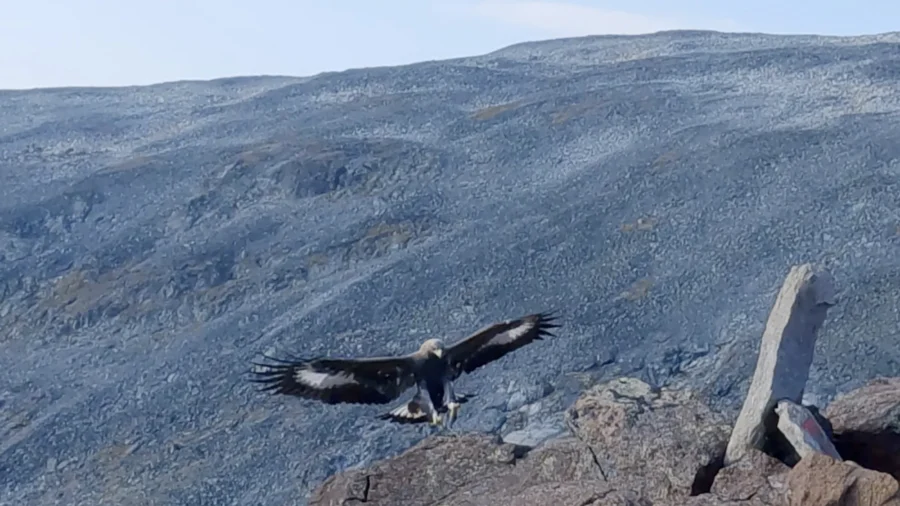COPENHAGEN, Denmark—At first, Francis Ari Sture thought a human was trying to shove him down the steep Norwegian mountainside. Then he saw the golden eagle land.
“We are staring at each other for, maybe, a whole minute,” Sture told The Associated Press on Monday. “I’m trying to think what’s in its mind.”
The bird then attacked Sture five more times Thursday, scratching and clawing the 31-year-old bicycle courier’s face and arms over 10–15 minutes as he sprinted down the mountain. The same eagle is believed to be responsible for attacks on three other people across a vast mountainous area of southern Norway over the last week, including an assault on a toddler Saturday that required the child to get stitches.
The golden eagle—common in Norway and the Scandinavian country’s second-largest bird of prey, with a wingspan of about 2 meters (6.5 feet)—typically eats smaller animals, as well as foxes and sheep. The toddler and the bird’s other victims needed stitches and medication for deep gouges. The bird was killed after the attack on the small child.
The golden eagle “likely had a behavioral disorder” that prompted the aggression, Alv Ottar Folkestad, an eagle expert with BirdLife Norge, told the AP on Monday.
What happened is “radically different from normal,” Folkestad said, adding that the attacks were likely all by a female eagle born this year.
“Details in the plumage make me believe it is the same bird. The plumage means that no two golden eagles are alike,” he said, adding that in the past days there were “favorable weather conditions” with high-altitude winds for the eagle to fly long distances over southern Norway.
In the most recent attack, a 20-month old girl was playing outside a farm in Orkland, a small municipality in the south, on Saturday when the eagle came “out of the blue” and clawed her.
The girl’s father, who was not there during the attack, told Norwegian broadcaster NRK that the mother and a neighbor raced to fight the eagle. The raptor attacked three times before it was killed when hit with a piece of wood, Folkestad said.
The father said his daughter got a couple of stitches and has scratch marks on her face. The VG newspaper said that one of the wounds was just under one of the girl’s eyes. She and her mother are doing fine.
Neither the toddler nor the family were identified and they have asked not to be contacted, NRK said.
Police said they were aware of the attack but had no detailed knowledge of the incident, saying a gamekeeper had been contacted.
In addition to Sture and the toddler, two other people have reported being attacked. One caught the incident on camera, while the other described a crushing weight as the bird swooped on her.
Mariann Myrvang, who was attacked on Wednesday, told NRK she cried out for help when “something big and heavy landed on my shoulders.”
“I went down on my knees, because I couldn’t stand up,” she said.
Armed with a branch, her husband chased the eagle away. The claws went deep into Myrvang’s flesh and she later received penicillin and a tetanus shot at the hospital.
Sture, the following day, tried using his backpack as a shield. He also kept pushing the bird down to his feet so he could kick it away from him. But no matter what he did, the eagle kept coming back.
Rushing down 50 meters (164 feet) of steep terrain covered in loose rocks, he panicked he’d slip. But falling unconscious was his biggest fear because the eagle potentially “would start to eat me.”
The eagle finally flew away, but Sture still had a two-hour hike to get to a campsite. He hadn’t packed a satellite phone, and cellphone service was spotty. He was able to call his father, and the closest hospital sent a taxi to pick him up.
He arrived covered in blood and exhausted, with a gouge just centimeters from his left eye that he captured in a selfie before leaving the mountain. The doctors credited his sunglasses and a long-sleeved shirt with saving him from worse injuries. After he received a tetanus shot, his brother drove him 6 hours home.
Despite his ordeal, he plans to keep hiking.
“I may be a bit more paranoid, may be looking up more a bit,” Sture said. “But I’m definitely going back hiking. Maybe not that summit—for awhile.”
By Jan M. Olsen and Stefanie Dazio

